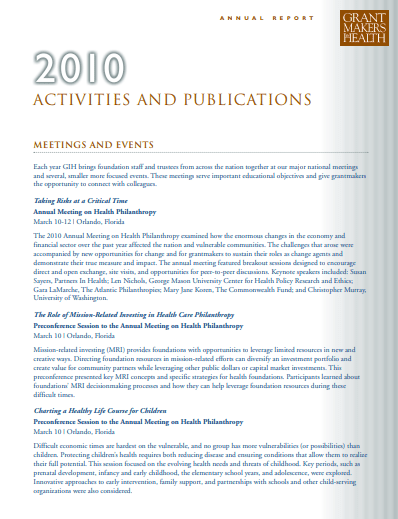Annual Report 2010
This annual report looks back on 2010 and briefly summarizes highlights of the year and key facts about GIH’s operations and governance.
Prevention: Keystone in the Architecture of Health Reform
The passage of the Affordable Care Act elevates the priority of public health and prevention efforts through new funds for health promotion activities, requirements to cover preventive services, and a national framework to view health through the lens of wellness and chronic disease prevention.
GIH Bulletin: June 2011
BHHS Legacy Foundation (Phoenix, AZ) has pledged to donate up to $50,000 for relief efforts pursuant to this year’s recent tornadoes and severe storms.
Connecting Kids to Coverage
State Medicaid programs and CHIP play a crucial role in providing coverage for low- and moderate-income children. Together, they provide access to preventive and primary care services to over one-third of all children and nearly 60 percent of low-income children.
2011 Terrance Keenan Award Acceptance Speech
Read the acceptance speech of Drew Altman, head of The Henry J. Kaiser Family Foundation, upon receiving the 2011 Terrance Keenan Leadership Award in Health Philanthropy. He shares his thoughts on what foundations should be, concerns about the field, the theory of change, and his experience transforming Kaiser into what it is today.
GIH Bulletin: May 2011
Aetna Foundation (Hartford, CT) allocated a total of $454,000 to four programs that provide medical and scientific educational opportunities for middle school, college, and medical school students from minority populations.
Guide to Impact Investing (2011)
This guide provides a framework to help funders think strategically about the potential of impact investing, part of a growing practice that incorporates environmental, social, and governance criteria into investment decisionmaking.
Paying (Overdue) Attention to Bullying Prevention
Bullying is not a natural part of growing up; it is a painful and preventable experience in the lives of many children and youth. Approximately 30 percent of children and youth have bullied or have been bullied.
Reaching Out to Employers About Health Reform’s Potential
The Affordable Care Act offers an unprecedented opportunity to increase health insurance coverage and access for many Americans. The new law is particularly relevant to the business community as the timeline for implementation moves forward.
GIH Bulletin: April 2011
Allegany Franciscan Ministries (Palm Harbor, FL) awarded approximately $200,000 to organizations working to improve the overall health status of individuals through increasing access to health services and information.

